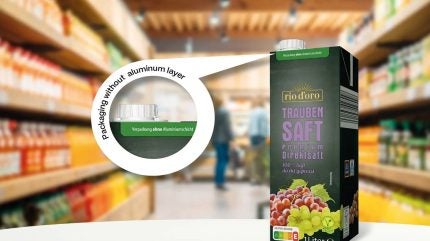
SIG has introduced one-litre aseptic carton packs made from Terra Alu-free + Full barrier material without an aluminium layer.
This move aims to reduce the environmental impact compared to standard SIG cartons.
After success with single-serve cartons, SIG is now applying its aluminium-free material to the juice category and multi-serve formats.
In parts of Germany, retailer Aldi will use this packaging for its Rio d’oro grape juice, which lowers the carbon footprint of standard multi-serve cartons by 29%.
The cartons are filled by Quargentan, an Italian food and beverage producer, using its existing SIG Midi 12 Aseptic filling machine.
The new material reportedly matches the protective qualities and 12-month shelf life of standard SIG aseptic cartons.
Available worldwide, the packaging material works with existing SIG filling lines, capable of producing up to 24,000 small cartons or 15,000 multi-serve cartons per hour.
Minimal changes to filling machines are needed, allowing manufacturers to switch easily between aluminium-free and standard materials.
By eliminating the aluminium layer typically used in cartons for products such as plant-based drinks, juice, or flavoured milk, the material uses over 80% paper and a thin polymer coating to shield against oxygen, light, moisture, and loss of aroma.
This reduces the number of raw materials used from three to two and, when paired with wood-based polymers, can decrease the carbon footprint of multi-serve SIG cartons by up to 61%.
SIG Europe president and general manager José Matthijsse said: “At SIG, one of our goals is to increase the paper content in our aseptic cartons to at least 90% -including the closure – by 2030, allowing further reduction of carbon emissions, and creating a regenerative food packaging system.
“On the way there, we have developed this packaging structure that is made of more than 80% paper and reduces the number of raw materials from three to two.
“This breakthrough innovation has the potential to streamline the recycling process for aseptic cartons, only requiring the separation of paperboard and polymers.”
Earlier this month, SIG unveiled its plans to expand its advanced aseptic carton production facility in Querétaro, Mexico.







